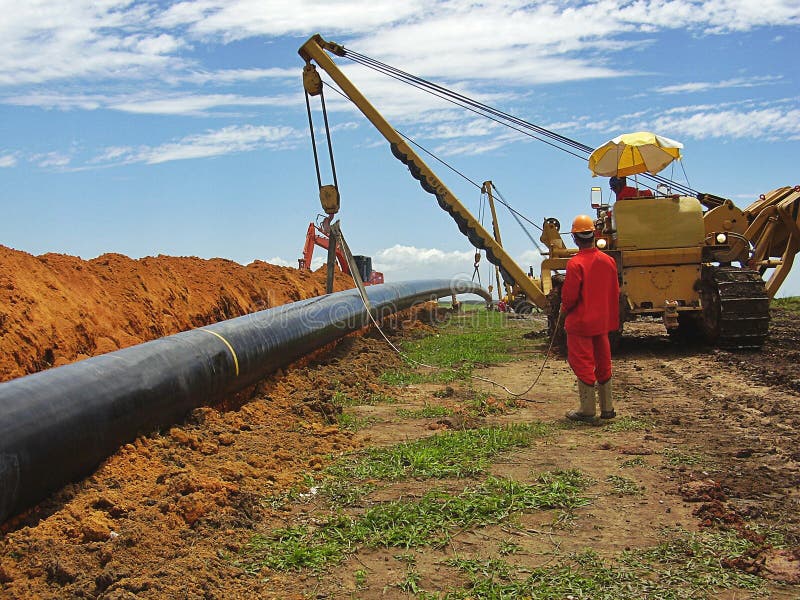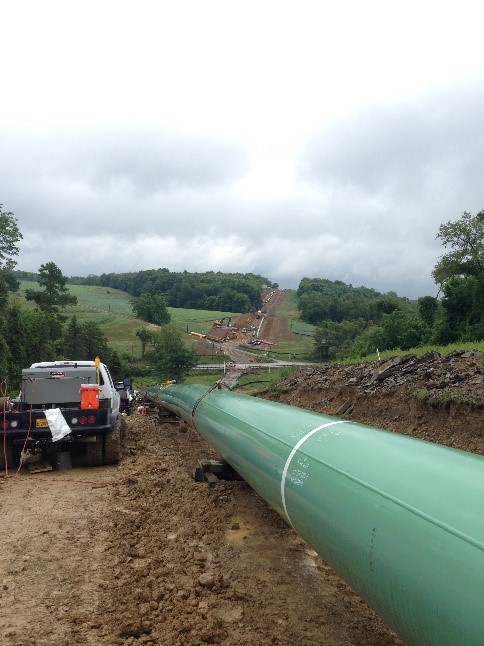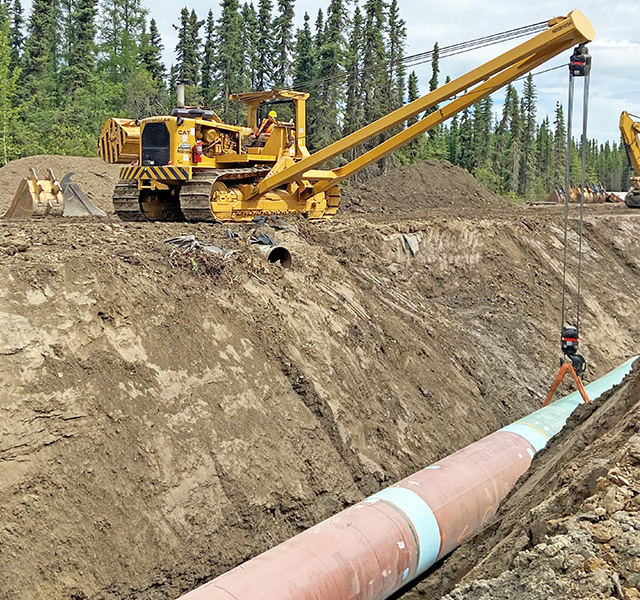Modern Project Management with Pipeline Construction Excellence
Why Pipeline Construction Is Essential for Power Facilities Advancement
Pipeline construction plays an essential role in the growth of energy infrastructure, offering as the backbone for the transport of vital resources like oil and all-natural gas. This intricate network not just helps with effective circulation however also boosts economic growth through task development and neighborhood financial investment. In addition, innovations in safety modern technologies are dealing with ecological issues, positioning pipelines as a keystone of sustainable power strategies. However, the intricacies surrounding pipeline jobs elevate important questions about regulatory structures and their long-term influence on communities and communities. Checking out these measurements discloses a complex story that necessitates mindful factor to consider.
Function of Pipelines in Power Supply
The important role of pipelines in energy supply can not be overemphasized, as they work as the backbone of contemporary energy facilities. Pipelines are crucial for the reliable transport of numerous kinds of energy, consisting of oil, gas, and improved items. They facilitate the movement of these resources from extraction sites to refineries and warehouse, ensuring that energy gets to consumers in a prompt manner.The construction of pipelines entails careful planning and adherence to regulative criteria, mirroring the intricacies of the energy market and environmental factors to consider. Effective pipe networks are created to decrease transit times, decrease costs, and improve safety and security, while additionally dealing with potential environmental effects. The capability to deliver huge quantities of power over cross countries makes pipelines a recommended choice for energy firms wanting to maximize their supply chains.Moreover, pipelines add to energy protection by diversifying supply courses and resources. As worldwide energy needs vary, pipelines make it possible for regions to gain access to various power materials, mitigating threats linked with reliance on solitary resources. This diversity fosters affordable rates and stabilizes markets, which is vital in a progressively interconnected global economy.In addition to their logistical benefits, pipelines sustain neighborhood economic climates by producing jobs throughout construction and upkeep phases. The presence of a durable pipeline framework also attracts financial investments in energy projects, better boosting local growth. Ultimately, pipelines are vital to the energy field, giving a trustworthy and effective ways of transport that underpins economic development and sustainability.

Advantages of Reliable Transportation
Efficient transport through pipe systems provides significant benefits, consisting of minimized transportation prices and improved shipment speed. These benefits not only improve the general business economics of energy circulation but additionally play an essential duty in decreasing the ecological influence connected with energy transportation. As power demands proceed to climb, the value of maximizing transportation approaches comes to be increasingly noticeable.

Decreased Transport Expenses
Minimized transport costs stand for a remarkable benefit in the domain name of power framework development. The construction of pipelines supplies an extra financially viable means of carrying energy sources contrasted to alternate approaches such as trucking or rail transport. Pipelines, once developed, allow for the continual circulation of oil, gas, and various other items over fars away with marginal functional costs.One of the key factors for reduced transportation expenditures is the efficiency of pipeline systems. They can deliver huge volumes of products all at once, thus spreading taken care of prices over a greater quantity of item. This bulk transport capability notably lowers the cost each, making energy sources more inexpensive for customers and businesses alike.Additionally, pipelines minimize the dangers and costs connected with handling and saving unpredictable products. Unlike rail or roadway transport, which can incur delays and damage, pipelines offer a safer and more constant approach of power conveyance. Consequently, this dependability improves the financial feasibility of power tasks, enabling for better pricing structures in open markets. Ultimately, decreased transportation costs foster a more lasting power sector, advertising wider accessibility and motivating financial investment in further development.
Improved Distribution Speed
Pipelines significantly improve distribution speed in energy transportation, offering an essential benefit over conventional approaches such as trucking or rail systems. The continuous flow of products through pipelines enables for a stable and efficient transportation procedure, reducing hold-ups connected with loading and unloading. This consistent movement is especially important for power sources, where need can rise and fall rapidly.Moreover, pipelines can run around the clock, untouched by website traffic conditions or weather-related disruptions that can impede road or rail transportation. This integrity assures that energy products reach customers quickly, sustaining operational demands and boosting financial security. In enhancement, the scalability of pipe systems helps with the handling of big quantities of energy, which is important for satisfying the growing demands of markets and residential sectors.Furthermore, the assimilation of sophisticated tracking and control innovations in pipeline systems improves the shipment process. These technologies enable real-time monitoring of circulation rates and system stress, ensuring that any kind of potential concerns are resolved quickly. Overall, the improved delivery rate provided by pipelines is a considerable consider enhancing energy framework and guaranteeing that supply chains stay durable and responsive to market demands.
Environmental Effect Considerations
The advantages of swift energy transportation extend beyond logistical advantages; they additionally incorporate considerable environmental considerations. Efficient pipeline systems permit the transport of energy resources with marginal disturbance to environments contrasted to different methods such as vehicle or rail transport. Pipelines can promote the activity of oil, gas, and various other materials in a highly focused way, which reduces the carbon footprint linked with power distribution.Moreover, pipelines are developed with advanced safety and security and tracking innovations that greatly lower the threat of spills and leakages. A reliable pipe facilities minimizes the need for regular transport tasks, which can lead to decreased greenhouse gas discharges in time (Midland Pipeline Construction Authority). The capacity to carry power sources directly to customers decreases reliance on more contaminating transportation techniques, better profiting air quality.In enhancement, strategic pipe positioning can assist maintain sensitive habitats by adhering to existing passages, thereby minimizing the influence on wild animals and all-natural landscapes. On the whole, the construction of pipelines not only supports energy framework growth but additionally supplies an ecologically responsible means of carrying energy, contributing to a much more lasting future
Economic Influence of Pipeline Projects
The financial impact of pipe tasks prolongs past mere transportation efficiency, substantially affecting neighborhood and regional economies. These efforts develop work opportunities during both construction and continuous operations, fostering neighborhood development (Pipeline Construction Excellence). In addition, the stimulation of economic development via raised investment and framework improvement is an essential benefit of pipe construction
Work Production Opportunities
While energy infrastructure tasks commonly deal with scrutiny, they provide considerable work production opportunities that can favorably influence neighborhood economic situations. Pipeline construction projects require a varied series of skilled labor, including engineers, project supervisors, and specialized specialists, in addition to unskilled workers for numerous roles. This multifaceted demand for labor can cause the development of hundreds of work during the construction phase and commonly leads to long-lasting job opportunity once the facilities is operational.In enhancement to direct work, pipe tasks boost regional economic situations by creating secondary task opportunities in industries such as transport, manufacturing, and friendliness. Regional organizations gain from increased need for products and services, adding to total economic health. Additionally, the influx of employees can bring about raised tax obligation profits for city governments, which can be reinvested in social work and infrastructure.Moreover, pipe construction jobs often focus on hiring local workers, cultivating a feeling of neighborhood investment and support. By connecting the space view publisher site in between energy supply and need, these tasks not just enhance power safety but likewise work as stimulants for economic growth, reinforcing the relevance of pipe construction in job creation initiatives.
Financial Growth Stimulus
Pipeline projects work as a powerful economic growth stimulation, driving considerable investments right into neighborhood and local economic climates. The construction and operation of pipelines develop a causal sequence, producing need for materials, tools, and services (Permian Basin Pipeline Solutions). This influx of capital supports neighborhood services, from producing to friendliness, cultivating a robust financial environment.Moreover, these projects create considerable tax obligation incomes for towns and states, which can be why not check here reinvested in civil services, facilities improvements, and neighborhood advancement efforts. The economic advantages expand beyond prompt task development, as knowledgeable labor is frequently needed for continuous upkeep and procedures, guaranteeing lasting employment opportunities.Additionally, the enhanced energy facilities facilitates the reliable transport of resources, potentially lowering energy prices for consumers and organizations alike. By improving energy access, pipelines can bring in new sectors and boost development in existing fields, adding to overall financial diversity
Ecological Factors To Consider and Developments
Balancing energy needs with ecological integrity ends up being significantly important as pipe construction broadens. The search of efficient power transport have to make up ecological impacts, requiring ingenious methods and innovations that decrease eco-friendly disturbance. Modern pipe projects are significantly integrating innovative environmental analyses at every stage, ensuring that prospective threats are identified and mitigated early in the preparation process.One noteworthy advancement in this field is the adoption of trenchless technology, which permits the installation of pipelines without substantial surface area interruption. This method decreases environment fragmentation, protects existing ecological communities, and minimizes the carbon impact related to conventional excavation methods. Additionally, real-time tracking systems furnished with sensors enable operators to identify leakages or ecological adjustments rapidly, therefore facilitating timely responses to potential hazards.Moreover, the unification of eco-friendly products and construction techniques is acquiring traction. Biodegradable boring fluids and corrosion-resistant coverings can substantially decrease the environmental impact of pipe jobs. Firms are also committing to restoring habitats post-construction, using indigenous plant species to assist in ecosystem recovery.Collaboration with ecological companies and regional areas is essential - Pipeline Construction Excellence. Engaging stakeholders in the decision-making process promotes transparency and advertises lasting techniques, ensuring that energy facilities development straightens with like this environmental stewardship
Difficulties in Pipeline Construction
Amidst the growing need for power framework, various difficulties complicate the construction of pipelines. One of the main problems is the geographical variability of pipeline routes, which can traverse varied landscapes, consisting of mountains, rivers, and metropolitan locations. Each setup calls for customized engineering remedies to attend to environmental protection, geological stability, and logistical constraints.Additionally, the public perception of pipe jobs usually positions a substantial difficulty. Local communities might share worries relating to prospective ecological effects, security threats, and disruption throughout construction. This opposition can lead to hold-ups, increased costs, and the necessity for extensive area engagement techniques to foster acceptance.Moreover, labor scarcities in proficient professions even more make complex pipe construction initiatives. As the demand for power facilities grows, the availability of experienced employees lessens, which can bring about job hold-ups and enhanced labor prices. The pipe industry should invest in labor force growth initiatives to grow a skilled labor force efficient in satisfying the progressing demands.Safety remains a vital worry throughout the construction process. The sector deals with the difficulty of guaranteeing that all security methods are stuck to, as even small lapses can lead to substantial mishaps. This necessitates rigorous training and oversight to preserve functional integrity.Lastly, varying product prices can influence task budget plans and timelines. The demand for premium materials, combined with market volatility, calls for mindful financial planning and risk mitigation techniques to keep jobs on track. Resolving these difficulties is important for the effective and efficient construction of pipelines as component of a durable power facilities.
Governing Structure and Conformity
The regulative framework regulating pipe construction is complex and multifaceted, requiring conformity with a variety of government, state, and regional guidelines. At the federal degree, companies such as the Federal Power Regulatory Compensation (FERC) and the Pipeline and Hazardous Products Safety Management (PHMSA) play critical roles in looking after pipeline tasks. FERC regulates the transportation of gas and oil, accepting jobs based on economic need and public rate of interest, while PHMSA focuses on safety standards and the honesty of pipeline operations.State laws can vary substantially, with private states imposing their own allowing processes, safety and security laws, and ecological analyses. State public energy compensations might need additional scrutiny of recommended courses to guarantee marginal disturbance to neighborhoods and environments. Compliance with the National Environmental Plan Act (NEPA) is additionally needed, mandating detailed ecological influence analyses before task approval.Local guidelines may additionally make complex the conformity landscape, as communities frequently have certain zoning laws, land usage regulations, and area involvement requirements. Involving with local stakeholders is not only a governing requirement yet likewise a best method to facilitate smoother job execution.Moreover, the regulatory landscape is continuously evolving, influenced by public sentiment, technical improvements, and ecological plans, requiring consistent watchfulness from pipeline drivers. Guiding through this elaborate regulative structure is crucial for verifying that pipe construction jobs are not only legally compliant yet also socially accountable and eco sustainable, thereby adding to the general effectiveness of power facilities development.
Future Trends in Pipeline Facilities
A considerable change is underway in pipeline framework, driven by advancements in innovation, evolving energy demands, and increasing environmental consciousness. As the global power landscape shifts in the direction of renewable resources, pipe systems are adjusting to fit diverse energy kinds, including gas and biofuels, while additionally integrating more innovative monitoring and security technologies.One significant fad is the incorporation of electronic services, such as Internet of Points (IoT) tools and expert system (AI), which boost real-time tracking and anticipating upkeep capabilities. These advancements not just enhance functional performance yet likewise markedly reduce the threat of leaks and crashes, making certain greater environmental management. Furthermore, the use of sophisticated products, such as composite pipes, is getting traction as a result of their durability and resistance to rust, additional expanding the lifespan of pipe systems.Moreover, the emphasis on sustainability is prompting the growth of greener construction practices. Methods such as trenchless technology lessen land disturbance and ecological impact, straightening pipe tasks with contemporary ecological standards. In addition, regulative structures are advancing to promote openness and liability in pipeline operations, making sure stakeholders are a lot more informed regarding possible dangers and benefits.
Frequently Asked Inquiries
How Do Pipelines Contrast to Various Other Transportation Methods for Energy Resources?
Pipelines provide a cost-efficient, efficient, and eco-friendly method for delivering power resources compared to alternatives like trucks and trains, which usually incur higher operational prices, greater land use, and enhanced greenhouse gas exhausts. - Pipeline Construction Excellence

What Products Are Frequently Utilized in Pipeline Construction?
Typical materials used in pipeline construction include carbon steel, stainless steel, and plastic compounds. These products are chosen for their strength, toughness, deterioration resistance, and suitability for different environmental problems and kinds of moved energy sources.

For how long Does It Generally Take to Build a Pipe?
The duration for pipe construction differs significantly based upon aspects such as size, terrain, and governing needs. Generally, it can vary from several months to a few years, depending upon task complexity and environmental factors to consider.
That Are the Key Stakeholders in Pipeline Projects?
Secret stakeholders in pipeline projects include federal government companies, regulatory bodies, power firms, ecological companies, neighborhood neighborhoods, and landowners - Midland Pipeline Construction Authority. Each team plays a vital role in planning, permitting, construction, and ongoing operations of pipeline facilities
What Are the Primary Security Measures During Pipeline Construction?
Throughout pipe construction, primary precaution consist of rigorous site assessments, adherence to regulative standards, thorough training for employees, using individual protective devices, and continual monitoring of ecological problems to mitigate risks and ensure functional safety and security.